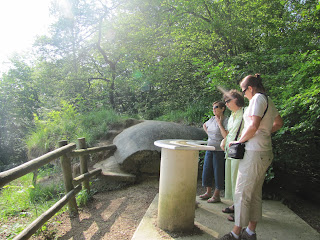This morning we went out for a walk in the magnificent forest that has been inviting us from our room window since our arrival. The natural forest covers the crowns of the hills before making way for vineyards on the lower slopes.
Inside the national park you can
also find the very strange, weird, mysterious Faux de Verzy. It is a variety of beech and is also called
“tortuosa” because of the deformities of the trunk and branches. The story is that the trees grow very slowly
but get very old. Not sure how to
confirm this, as strangely enough there is very little information about it. Apparently scientist have been trying to
figure this growth pattern out for years, and not having success. It
grows in the form of an igloo with new roots forming where the branches touch
the ground. The trees are protected by
barriers with nice signposting and some even being honoured with names. On is called le faux de la Demoiselle, in honour
of Joan of Arc, said to have slept in the forest.
The walk in the forest was like food for the soul. We also walked up to the lookout at Mt Sinai, the highest point in the park (at only about 280m above sea level) for a most beautiful view over the area. Here you could see the remnants of a bunker I assume dating from WW11.
 After a quick sip of bubbly to revive the spirits at Louis de Sacy Champagne House in Verzy, we trekked through the vineyards back towards Verzenay. Louis de Sacy is a well-established brand of champagne in France, though this was my first introduction to the champagne. The “original” Louis de Sacy was born in Paris in the 17th century, and the business is currently in the 12thgeneration of the family.
After a quick sip of bubbly to revive the spirits at Louis de Sacy Champagne House in Verzy, we trekked through the vineyards back towards Verzenay. Louis de Sacy is a well-established brand of champagne in France, though this was my first introduction to the champagne. The “original” Louis de Sacy was born in Paris in the 17th century, and the business is currently in the 12thgeneration of the family.  The trek may sound impressive, but the villages are a mere 3km apart. It was amazing to see people working in the vineyards, totally different to the South African approach. (Much less people doing the work). En route our path crossed that of the famous Phare of Verzenay.
The trek may sound impressive, but the villages are a mere 3km apart. It was amazing to see people working in the vineyards, totally different to the South African approach. (Much less people doing the work). En route our path crossed that of the famous Phare of Verzenay.
In 1909 a forward thinking wine
merchant got this brilliant idea to build a light house in the middle of
nowhere, as an advertising gimmick. It
had a restaurant and dance hall for parties year round. Sadly the shells of the First World War
brought an end to all the fun and the building became a derelict
structure. Then in 1987 the Municipality
of Verzenay acquired the lighthouse and converted it into a museum for
champagne, which opened in 1999. Once
again the beauty of the lighthouse is displayed at night through colourful
lighting. The Musée de la Vigne is well worth a visit, if not for the views of
the surrounding vineyards, then to learn more about the history of champagne
and how it is manufactured.
 After managing to find Joretha’s
house in the labyrinth of streets in Verzenay, we had a quick lunch before
walking to Maison Jacques Rosseaux for a champagne tasting. We we greated by Celine, probably the fourth generation
of the family in the business, who showed us around the cellar and explained
the champagne-making business. They
currently also press grapes for Mumm.
Celine’s passion for the business is contagious and we spent a lovely
hour with her, sometimes struggling to understand her “Frenglish”. In the end she lent us a book of pictures of
Verzenay and gave us a gift of a wine-stopper for a champagne bottle and bottle
cages. The champagnes we tasted were all
blends of pinot noir and chardonnay, without the pinot meunier, which I am not
that used to.
After managing to find Joretha’s
house in the labyrinth of streets in Verzenay, we had a quick lunch before
walking to Maison Jacques Rosseaux for a champagne tasting. We we greated by Celine, probably the fourth generation
of the family in the business, who showed us around the cellar and explained
the champagne-making business. They
currently also press grapes for Mumm.
Celine’s passion for the business is contagious and we spent a lovely
hour with her, sometimes struggling to understand her “Frenglish”. In the end she lent us a book of pictures of
Verzenay and gave us a gift of a wine-stopper for a champagne bottle and bottle
cages. The champagnes we tasted were all
blends of pinot noir and chardonnay, without the pinot meunier, which I am not
that used to.
Thereafter we took another short
walk up the road to the champagne house of Jean-Yves de Carlini. This again is a family business, started in
1955, that produces about 70 000 bottles a year. They make quite a variety of champagnes, and
I very much liked the Extra Brut. She
also allowed us to taste the Millésime 2000, which is a ten-year old
champagne.

Back home at the Despres we were
treated to a lovely salmon dinner and chocolate moelleux for dessert. The after-dinner cheeses on offer were St
Nectaire, Comte and Pont l’Eveque.












No comments:
Post a Comment